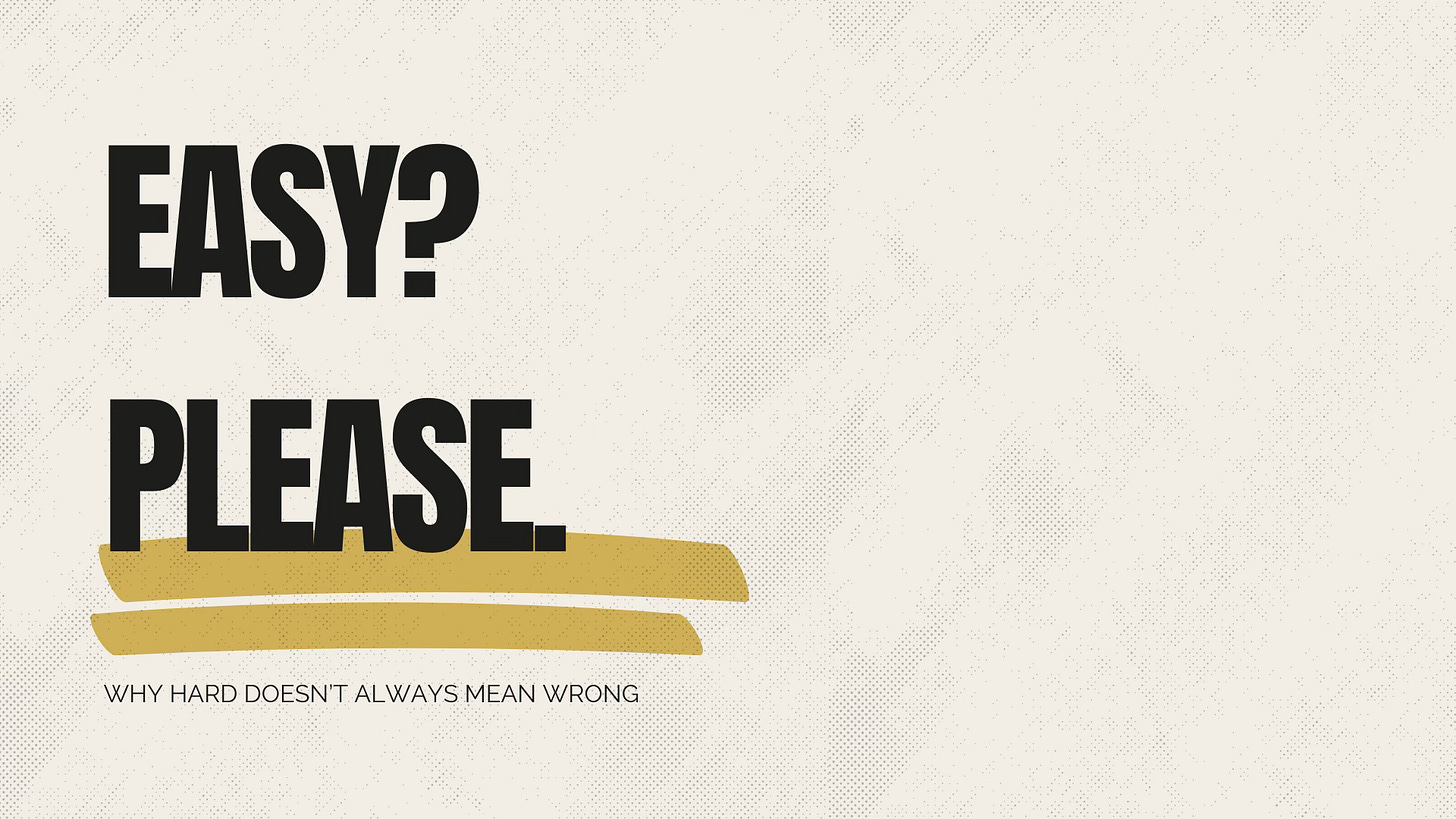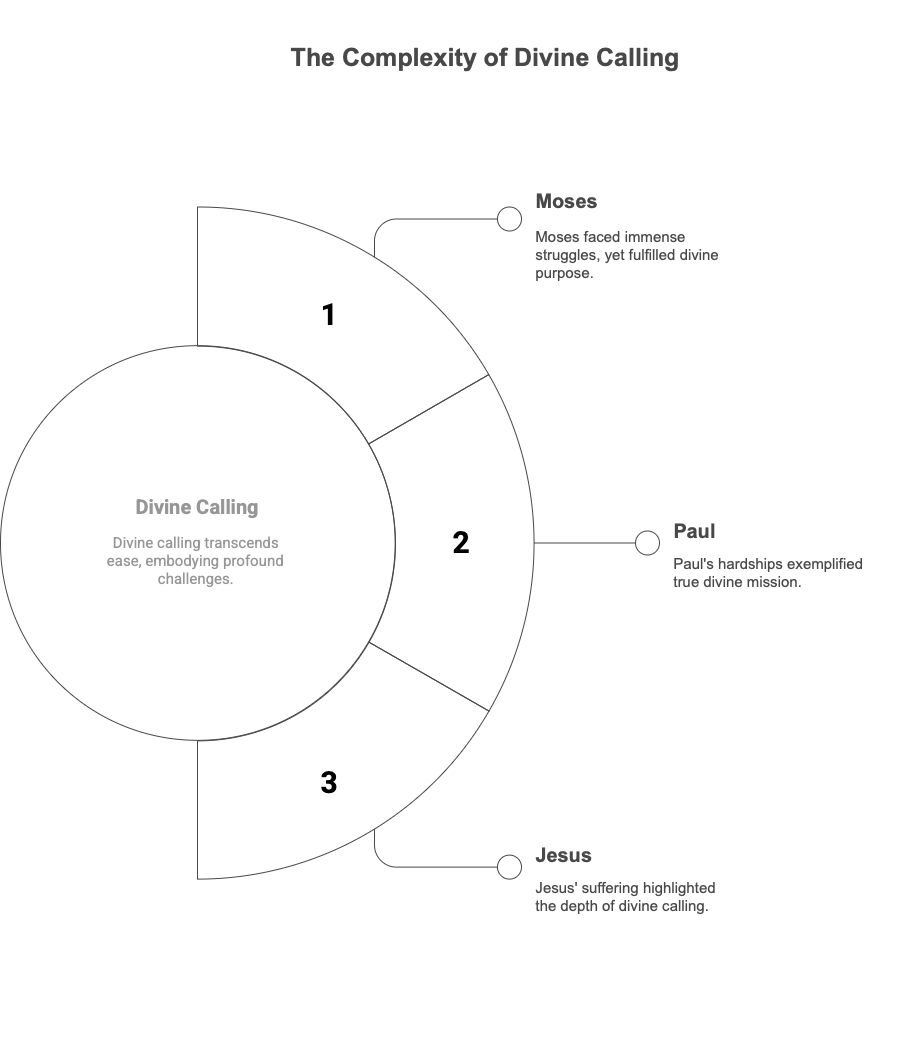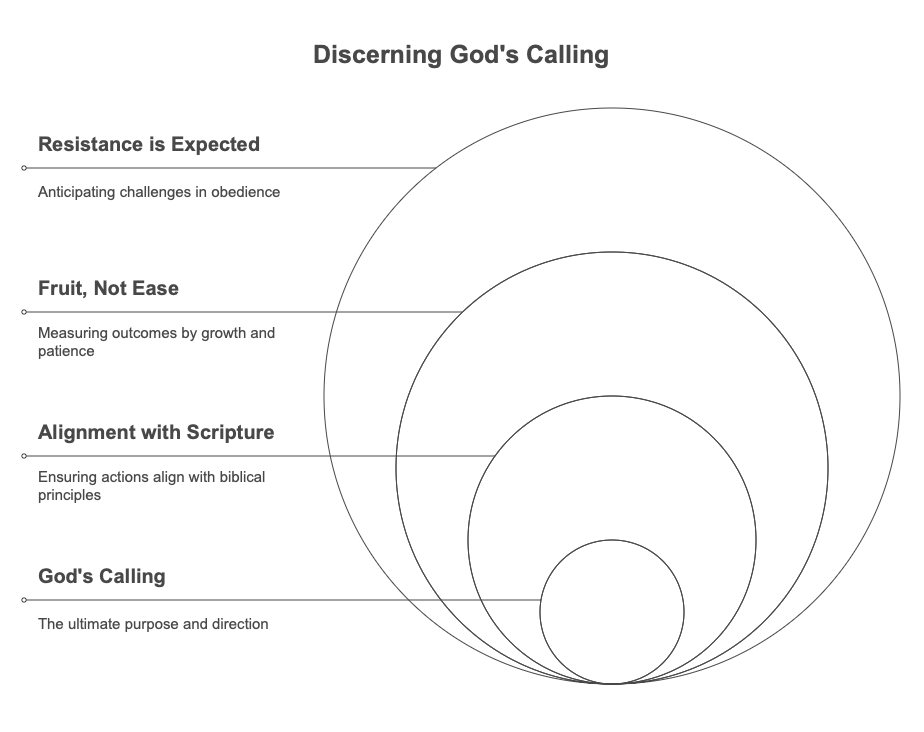Easy? Please.
Why hard doesn't always mean wrong.
There’s an unspoken rule in modern Christian circles that has crept into our thinking:
If something is hard, it must not be from God.
If it’s easy, well, that’s all the proof we needed that Yahweh was behind it all along. The logic sounds like this: if God calls you to do something, He will pave the way, smooth the rough patches, and make the road rise to meet us. But if you hit resistance? If things get complicated? If you struggle? Well, maybe you misheard. Maybe it wasn’t God after all. Peer-to-peer counseling is most famous for propagating this kind of thinking. This didn't stop in the book of Job; it's only grown more present in today's American Christianity, characterized by a hard exoskeleton and a soft, vulnerable underbelly.
This idea isn’t just misguided; it’s dangerous. For some reason, it seems to be the best measurement people have today for figuring out whether God is truly in something. Was it easy? Then yes, God must have planned it. Was it hard? Then you must have made a mistake. But is that actually how God works? Is ease really the measure of God’s involvement? If these questions sound loaded to you, they should.
The Fallacy of Ease
Let’s start with the obvious flaw in this thinking. If ease were the indicator of divine instruction, then the prophets, twelve disciples, and even Jesus Himself must have been completely outside of God’s will. Take Moses, for example. The man literally argued with God about his calling at the burning bush, then got stuck in a 40-year leadership nightmare where his own people questioned him at every turn. Was that easy? Hardly. Did that mean it wasn’t God’s plan? Not on your life.
How about Paul? The man who wrote half the New Testament spent a significant portion of his ministry being beaten, imprisoned, shipwrecked, and left for dead. If ease were the measure of divine calling, Paul would have been the biggest failure in biblical history.
And then there’s Jesus. If ease was the measure, the cross itself was a cosmic miscalculation. The betrayal, the suffering, the agony—none of it was smooth, none of it was easy, none of it ended in financial prosperity (am I missing any American measuring sticks?). Even still, it goes without question that there was never a more divinely ordained moment in human history than Golgotha.
Where Did This Idea Come From?
So why do we, in our modern, Westernized Christianity, believe that God’s calling should be mostly free of struggle? Part of it comes from a misunderstanding of Scripture. We latch onto verses like, “My yoke is easy and my burden is light” (Matthew 11:30) and interpret them to mean that if something is hard, it must not be God. But Jesus wasn’t promising a life of ease; He was contrasting the unbearable weight of religious legalism with the truest rest found in Him.
Secondly, we have a cultural obsession with comfort. I've allowed Michael Easter's book to influence my writing before, but man, does it fit here. We live in an age where convenience is king. We can have food delivered to our door with the tap of a button. We avoid discomfort at all costs. And we’ve pulled that mentality into our thinking about God and the Christian life, convincing ourselves that if something is truly from God, it should feel "right." Show me that in the Bible. Don't bother looking, you won't find it. Comfort being king runs contra to everything God has programmed into the model. Easter writes:
But a radical new body of evidence shows that people are at their best—physically harder, mentally tougher, and spiritually sounder—after experiencing the same discomforts our early ancestors were exposed to every day. Scientists are finding that certain discomforts protect us from physical and psychological problems like obesity, heart disease, cancers, diabetes, depression, and anxiety, and even more fundamental issues like feeling a lack of meaning and purpose.
What does this tell us? It tells us that the Biblical way, the life experiences of those who walked this earth before the iPhone and McDonald's, had a distinct advantage in understanding how to achieve growth and maturity. It's a damn shame that pharmaceutical companies have been able to convince us that pills will produce what only pain can provide. Easy on the pill popping, Believer. You just may be calling more difficulty into your life, not less.
The Real Measure of God’s Calling
So if ease isn’t the measure, what is? How do we discern whether God is truly calling us to something?
1. Alignment with Scripture – God will never call you to something that contradicts His Sacred Text. If you think you’re being called to something that blatantly goes against the biblical narrative and its divine intent, that’s not divine guidance—that’s your brokenness guiding.
2. Fruit, Not Ease – Instead of measuring by ease, look at the predicted results of the action. Does this calling produce patience, perseverance, and growth? Does it push you closer to God rather than further from Him? Many of the most difficult callings bear the best results over time. Admittedly, this one is becoming more and more difficult in our modern societal pace.
3. Resistance is Expected – If you are called to do something that disrupts the status quo, expect pushback. The enemy isn’t in the business of making things easy for those walking in obedience. Resistance isn’t always a sign that you misheard God—it may be confirmation that you heard Him correctly, and the side opposed to all things good and holy has been activated to resist you.
A Dangerous Theology
When we convince ourselves that God’s will is measured by ease, we set people up for failure. We tell them, “If you’re struggling, you must be outside of God’s plan.” But that’s simply not biblical. We are called to faith, not ease. We are called to endurance, not comfort. We are called to pick up our cross, not to stroll down a path of least resistance.
This theology of ease creates weak believers who give up the moment they face hardship. It produces people who question God’s faithfulness because their journey isn’t effortless. And worst of all, it strips away the richness of perseverance, the kind of perseverance that builds character and deepens faith.
The Hard Road is Often the Right Road
Hardship doesn’t automatically mean you're off course. In fact, it often means you're exactly where you're supposed to be. God has never promised His people an easy path—only His presence on it. If your calling feels heavy, if your obedience costs more than you thought it would, pause before you question it.
Remember: God isn't most concerned about building your comfort. He's primarily working on building your character.
Faith is forged in the fire, not beside it.
Trust the process. Trust he's taking you to a place you'd never plan to go yourself, but one you later wouldn't trade for your life. He knows us better than we know ourselves, and that should be a comfort to us all.





